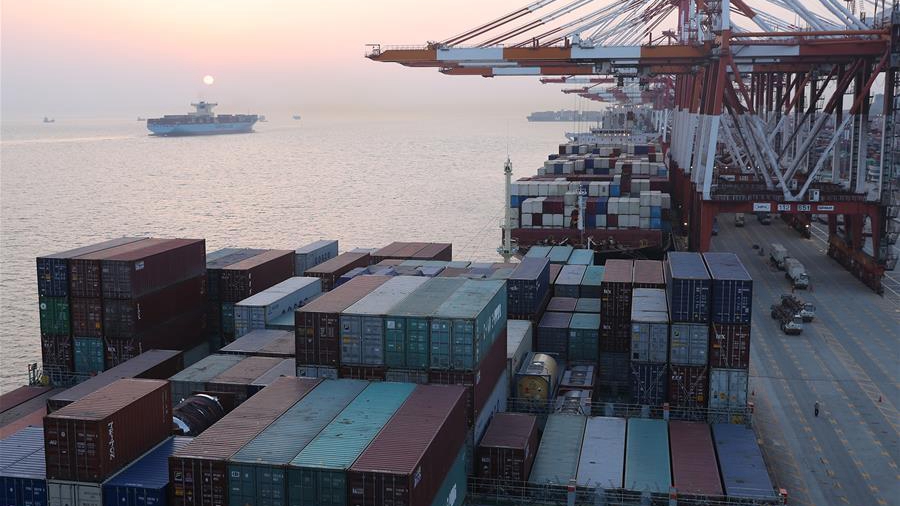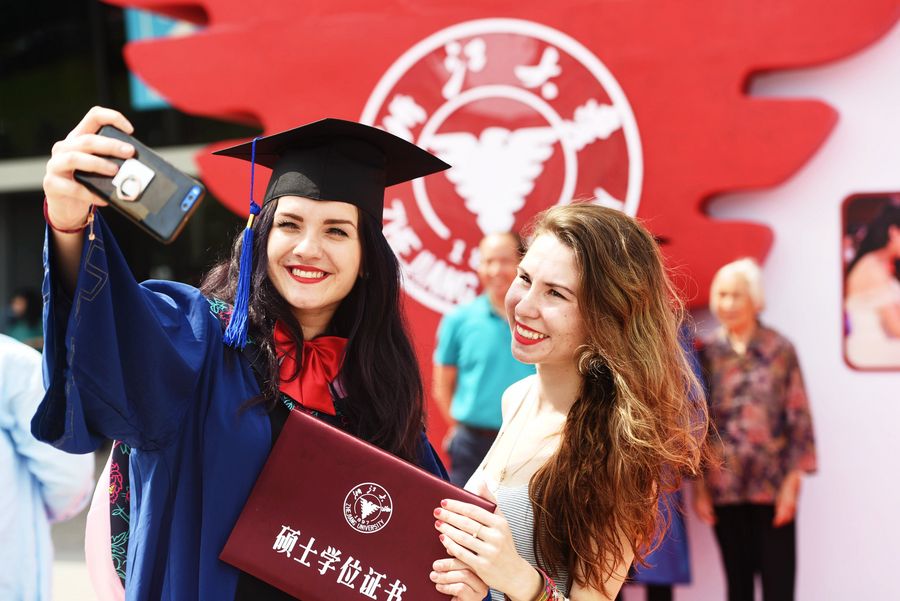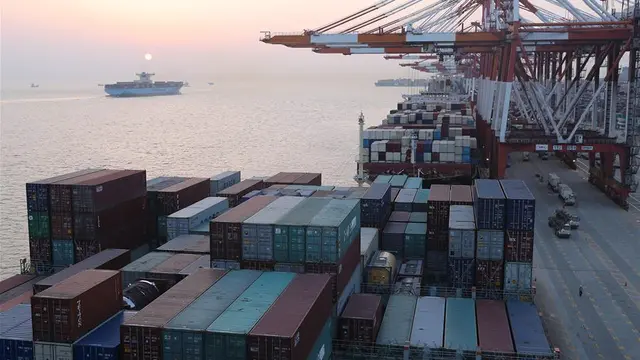
Containers on freighter Netherlands of China Ocean Shipping (Group) Company (COSCO) at a wharf in east China's Shanghai Municipality, April 15, 2017. /Xinhua
**Editor's note: **Bradley Blankenship is a Prague-based American journalist, political analyst and freelance reporter. The article reflects the author's opinions and not necessarily the views of CGTN.
This year has exposed a dangerous trend in the political weaponization of scientific progress, be it vaccine nationalism, restricting student exchanges or other immigration-related matters that make intellectual diffusion more difficult.
China has largely been in the crosshairs of these attacks by Western countries over accusations of intellectual property theft or foreign interference. However, the allegations are politicized and fail to understand how healthy intellectual diffusion should work in the 21st century.
There is a historical element to this. With few exceptions, knowledge from low- and middle-income countries is rarely taken seriously in the West, especially when it comes to the colonized world.
Idea exchange in academia has always been around, but it has largely been one-sided in favor of Western countries. Human capital flight is one symptom of this one-sided phenomenon, as Western countries routinely siphon talent from lower- and middle-income countries that excel in subjects useful for their own economic growth, often exploiting those immigrant workers –especially in the case of the United States.
What little is able to penetrate from low- and middle-income countries or colonized nations of people to the Western world is most often appropriation or fetishization. This is seen in a way that not only bears the scar of colonialism but is more a continuation of it.
China's opening up to the world has taken much of this same one-sided character, but in thiscase, it has been extremely successful because it has resisted much of the same exploitation. This is precisely why Western countries are fed up with this relationship that they now see as unfair, i.e. a one-sided relationship where ideas only go one way. However, the fault is entirely on the West for this dynamic.
Unlike the former Soviet Union, modern China chose a different developmental path toward socialism that broke the siege mentality and transcended the East-West divide. China made itself indispensable to the global economy through its opening up, driving much of the world's economic growth since that time.
One natural consequence of this opening up has been cultural and intellectual diffusion. In allowing the country to open up to foreign investment, China wisely predicated this on having access to important technology that is often kept out of the hands of low- to middle-income countries.

A graduating foreign student takes selfies at Zhejiang University in Hangzhou, east China's Zhejiang Province, June 28, 2018. /Xinhua
Western countries might have believed, as is often the case, that by investing capital in China that it would mean the country would bend the knee and perhaps fundamentally change its political system. But this is not how it played it, which was exactly how former Chinese leader Deng Xiaoping and the Communist Party of China (CPC) had orchestrated China's reform and opening-up policies.
Opening up was not a retreat from socialism, nor a capitulation to Western cultural values, it was aimed at pursuing socialism from a scientific approach and not a purely ideological one. Hence the phrase "seek truth through facts."
It is commonly portrayed in the West that the CPC, the guiding hand of China, is an insular party, but nothing could be further from the truth. First of all, the CPC has millions of members; the party has disagreements and to deny this in favor of the notion that the main political force in China is a hive mind is plain racist.
The CPC has always strictly adhered to self-criticism to find what works and what doesn't. It dutifully studies other political systems, exchanging with political parties all over the world to observe and learn – and not just other communist parties. Such was the case with the CPC's interest in European social democracy during the time of the former Soviet Union's collapse, for instance.
A wealth of ideas also exist in Chinese society outside the CPC and are given ample space to find this truth through facts. There are liberals and conservatives well within what is considered mainstream in the West that teach and publish books and articles in China, for example, both foreigners and Chinese citizens.
This is to say that China has made the pledge and opened up to the Western world, but the Western world has not opened up to China and it is only hurting China's interests. The most clear example is obviously COVID-19.
China has controlled its coronavirus outbreak, yet Western countries can't even admit this as we enter into a brutal second wave. Ignoring an extraordinarily successful case of disease containment during a global pandemic and choosing not to learn from it is downright irresponsible.
But there are other areas outside the medical field where healthy intellectual diffusion can occur: astrophysics, engineering and telecommunications just to name a few. Western countries, however, hardly seem to cooperate in good faith on such breakthrough innovation and instead prefer to maintain a monopoly on technology.
It's all born from a sense of pride in the Western mindset that only those innovations made by the West are legitimate. The international scientific and intellectual community, however, is quickly recognizing that this is misguided with respect to China because of its astronomical push toward innovation. China has learned much from the West, and this should continue, but the West can also learn many things from China.
Western government officials must also recognize this. They should step aside when it comes to intellectual diffusion with China, allow scientific progress to continue unhindered, recognize that there is much to be learned from both sides and understand that China deserves to be seen as an equal for its achievements. Ideological clashes need not be a part of this discussion.
(If you want to contribute and have specific expertise, please contact us at [email protected].)
 简体中文
简体中文

